3 Ways To Build Your Child’s Digital Literacy
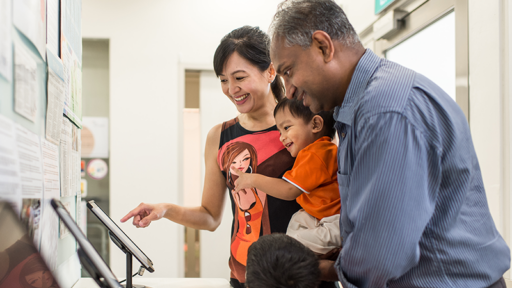

What is digital literacy, and why does it matter for your child?
As smartphones, tablets and other digital devices become more commonplace in our households, they’ve also become a bigger part of our everyday lives – and a huge part of your children’s lives. Understanding technology is important – as is learning how to use it to enable your children to learn, grow and develop.
Nurturing your children’s digital literacy skills is essential in today’s connected world. Digital literacy allows children to learn in fun and meaningful ways – and prepares them for new learning situations that could arise from the constantly evolving COVID-19 situation.
Digital literacy is the ability to understand and use technology. This means being able to locate and utilise information online in a useful way. It also includes the ability to create content for online platforms. But that’s not all. Being digitally literate also means knowing the limitations of technology – and the potential dangers it brings.
Now that we’ve covered what digital literacy is, let’s see how we can develop your children’s digital literacy. We hope that by the end of this article, you’ll have some ideas on how you can help your children nurture their digital literacy capabilities – so they will know how to search for information online, create content using digital tools, and share their content to safe online platforms.
As a parent, you can support your children by creating opportunities for them to use digital devices in meaningful ways. Let’s get started!
Does your children constantly ask you questions? Let’s channel that healthy dose of curiosity into a lesson in digital literacy.
The next time your inquisitive children ask you a question, instead of giving them the answer, encourage them to find the answer online. While there are many ways of finding answers online, a great place to start is Kiddle, which is Google’s child-friendly search engine! First, let’s make things simple for your child by making Kiddle your browser’s default starting page.
If your child is new to technology and typing, ask them to first write down their question on a piece of paper. Then, type it into the search bar. You can even create a “search engine guide” for your child, so they can learn to use Kiddle with minimal facilitation.
After searching for answers online, guide your children through a process of collating relevant information. They can use PowerPoint or Word to collate the information they find, then share their findings with their family and friends. If needed, your child can print out the information and keep it in a file. Encourage them to go beyond the first search result they see, so they can gain a broader perspective. As we mentioned a little earlier – there are many, many ways to find answers online!
This activity builds your children’s resourcefulness, while developing their cognitive and decision-making skills.
As your child is searching for information online, this is an ideal time to teach them about the dangers of the web. Similar to alerting parents when they encounter dangerous situations in real life, children should also adopt this same mindset when going online – if your child comes across content that could be dangerous or unhealthy, they should inform you about it (and not look at it or engage with it by clicking or tapping anything).
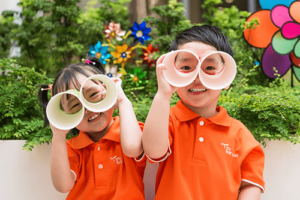
Creating content is an important part of digital literacy. This includes creating digital assets such as videos and pictures. Thankfully, with user-friendly apps, children can easily try their hand at video and photo editing – and see impressive results!
At My First Skool, this is one activity that encourages creativity in our children. Specifically, our children are given the task of telling stories by creating attractive videos – using fun and eye-catching techniques such as stop motion. Children work in a group to craft their story, prepare a storyboard and write a script. Next, they prepare materials and props. Then, they record and edit their project on video.
Projects such as these develop multiple areas of children’s skills – such as their writing and storytelling abilites, their creative skills and of course, their digital literacy.
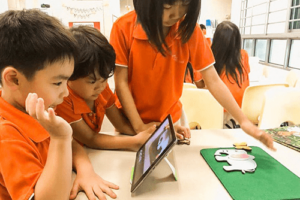
In addition to common digital devices (like laptops, mobile phones and tablets), there are also specific educational digital devices that are highly effective at teaching your children problem solving and logical thinking skills.
At My First Skool, children have access to these educational digital devices, which are used to teach children soft coding skills. One of these devices is the incredibly popular Bee-Bot – a robot bee that buzzes across the floor, navigates obstacle and reaches its destination, thanks to directional inputs that are planned by the children. The process of planning these directional inputs trains children to think in a logical, step-by-step manner – which is an important foundation in coding.
Activities like Bee-Bot teach children concepts such as a spatial awareness, directional sense and simple coding – while they’re having lots of fun with robots and friends!
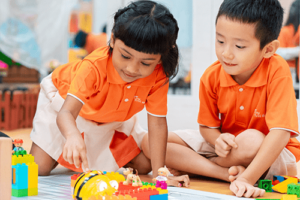
Children at My First Skool develop holistically, thanks to our comprehensive curriculum that nurtures a variety of abilities that are essential in young children – from digital literacy to language, numeracy, discovery of the world, motor skills, aesthetics and creative expression, as well as social and emotional development.
Best of all, our high-quality curriculum and care, doesn’t equate to high fees – our fees remain affordable, as our parent company’s (NTUC First Campus) mission is give every child a head start in life, regardless of their financial standing.
Interested in enrolling your child at My First Skool? Register your child for our upcoming 2020 and 2021 intakes, or take a virtual tour of a My First Skool preschool near you.
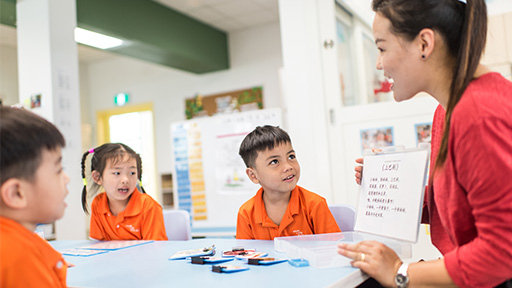
As parents, we often feel a responsibility to shield our child from global affairs. After all, why should a 4-year-old worry about matters outside of PAW Patrol and Peppa Pig?
But your toddler is inquisitive, curious about the world around them, and always asking questions – and this natural wonderment is crucial for their cognitive development. Being an excellent parent means engaging your child, feeding their curiosity and keeping them informed of current affairs. (After all, they’re already wearing masks outside and to school – hiding them from the truth of why they’re doing so, could be doing more harm than good.)
Children are naturally curious about their environment, so similarly to adults, developing an awareness of current issues exposes them to learning about their community and the world they live in. But unlike adults, the current affairs that children learn about is curated by parents and teachers – so they have to wade through the negativity that often floods social media and news platforms, but can still develop an excellent sense of social awareness.
Also, don’t worry if the term “current affairs” sounds complicated. The matters that your child will be discussing in preschool are likely to revolve around simple, everyday things that they notice – the reasons for wearing masks, the necessity of washing hands, why they occasionally spot abandoned shopping trolleys by the sidewalk, how come rubbish is sometimes on the ground (and not in a bin), why is a stranger feeding cats in the community, and the many sights and sounds that intrigue their young minds.
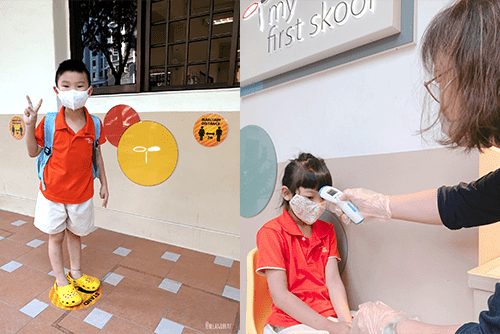
You can also leverage on trending issues to inform your child about events across the globe, and use these as opportunities for learning. For example, the Black Lives Matter movement gives all of us a valuable lesson on how diverse our world is, and how important it is for us to embrace our differences. (Fun fact: At My First Skool, we celebrate Racial Harmony Day on 21 July every year – children are encouraged to wear traditional costume to school and have fun as they appreciate and embrace the unique cultures around them.)
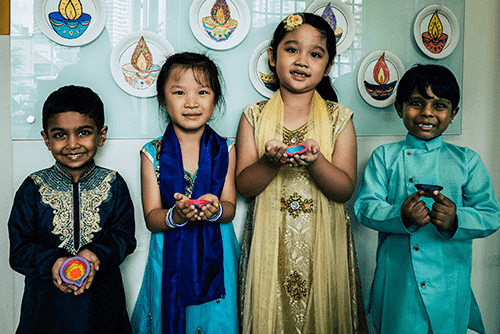
How My First Skool incorporates current affairs into our curriculum
At My First Skool, we believe in the importance of discussing current issues with children – expanding their minds and satisfying their insatiable curiosity, while developing their cognitive and communicative abilities.
In our learning environments, teachers bring up current issues that are relevant and age-appropriate for the children under their care. And they do so in a variety of ways, such as showing children photos from newspaper articles, discussing pictures and images from magazines, or talking about the new preschool routines that have been put in place to keep children safe (from germs and specifically, COVID-19).
These sessions are scheduled into our curriculum and conducted in both English and Mandarin, so students get to improve their listening and speaking skills in both languages.
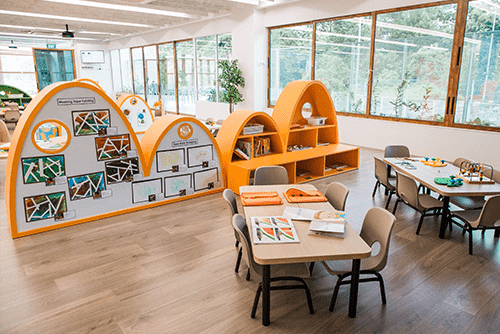
What can you do at home?
It’s important for parents to initiate these conversations with your child. Think of a few current topics that will interest your child, then use pictures and videos from newspapers, posters or their favourite YouTube videos to pique their interest.
Once your child is interested in a topic, they’ll naturally ask you questions about it. Respond to their queries with age-appropriate answers, and encourage them to observe other things around them as well. You can extend the conversation by reading books on these topics, then sharing fascinating insights with your child.
Keep these conversations light-hearted and fun, and let your child participate actively in the discussions too! (So these don’t become storytelling sessions.) Over time, you’ll find that your child will develop even deeper interests in the topics that fascinate them.
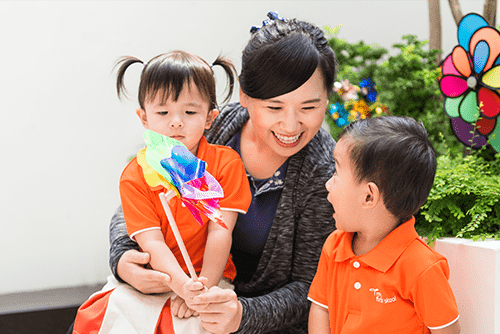
Expand your child’s curiosity and develop their cognitive abilities by enrolling them in a preschool that encourages and rewards inquisitiveness. Register your child at a My First Skool near you, or visit us virtually to find out more.
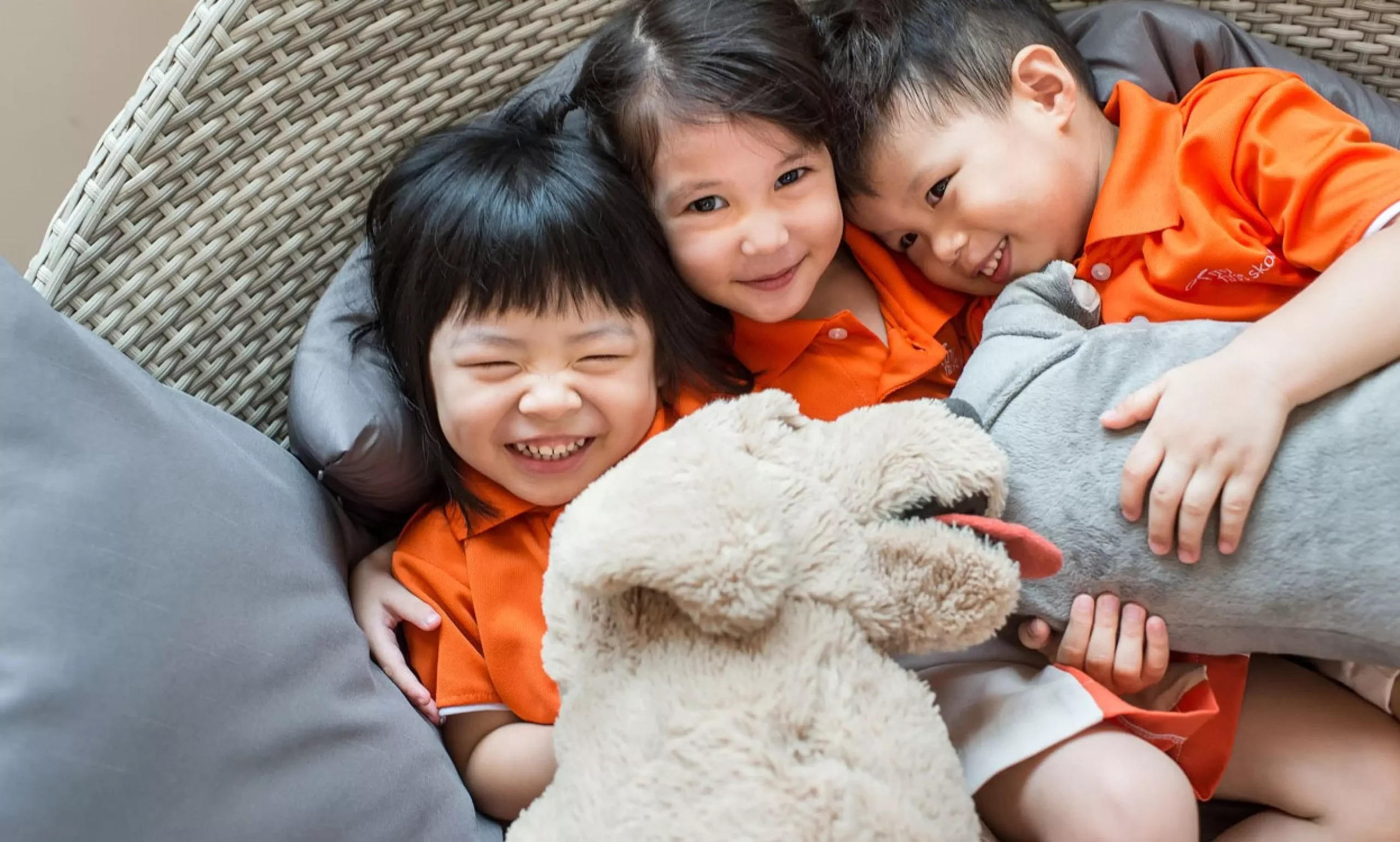
A common misconception among Singapore parents is that good preschools are expensive, leaving them with only two options – pay a pricey monthly fee for a reputable preschool, or save money by choosing a preschool that doesn’t offer the quality of care and education that they want for their child.
But is it true that your child can’t get the best of both worlds in Singapore? That is, a quality preschool with affordable fees?
We’re here to shatter this misconception.
At My First Skool, our standards are second to none. Whether it’s the qualifications of our educators, the quality of our learning environments, our proven curriculum, or anything else – you’ll find that we’re not simply on par with other reputable preschools, we exceed expectations. My First Skool is one of the best preschools in Singapore with affordable preschool fees.
1. The best minds, and the best practices, in the industry
We are proud of the curriculum used in (and out of) our classrooms. From our core curriculum to meal planning, every aspect of a child’s life at My First Skool is developed by a team of professionals in their areas of expertise. We have a large number of early childhood professionals who hold doctorates in their fields, and are well-recognised for their contribution in the sector.
Also, we have quality managers who ensure that educational practices are consistent across all the centres in our islandwide network. Parents will be glad to know that 100% of My First Skool centres that are eligible for SPARK certification, have been certified.
Going a step further, we also work with well-respected industry partners to ensure that our lessons and activities are the very best they can be.
2. Our evidence-backed curriculum is ideal for infants and toddlers
My First Skool is well-known for our relationships-based curriculum (RBC), which is our proprietary curriculum that is backed by science and evidence. In fact, research has shown that children who have undergone RBC display higher levels of active involvement, such as better concentration levels during learning. This is because of the trust infants and toddlers build with their educarers, which gives them the confidence and ability to learn and develop at their best.
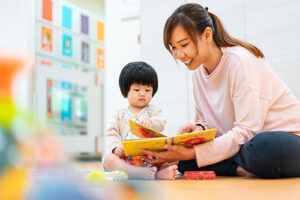
3. Niche programmes are featured in our classrooms
And this curriculum expands beyond the lessons our experts have developed. We also work with well-respected industry partners to incorporate niche programmes such as STEM-based learning (i.e. science, technology, engineering, maths), arts, bilingualism and cultural intelligence, character building, nature learning, and Malay heritage into our schedule.
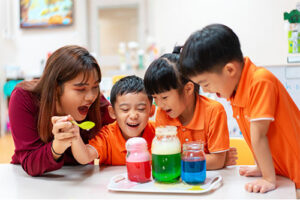
4. Conducive learning environments
Our schools are designed to optimise learning and development in young children. In our learning environments, you’ll find an impressive selection of learning resources, interactive learning corners that engage children in fun and creative ways, and plenty of opportunities for children to learn and play, both indoors and outdoors.
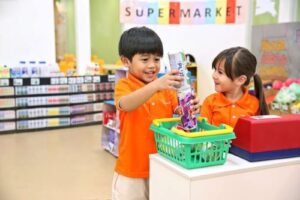
5. We implement industry-leading safety practices
When it comes to adopting best practices in health and safety, My First Skool has always led the way. And with concerns over the COVID-19 pandemic, we have proactively implemented best practices in all our centres. Our schools are stocked with commercial grade UV sterilisers, which our teachers and staff use to sterilise toys, kitchen equipment, as well as other items and areas. At our larger centres, temperature sensors are used to keep an eye on everyone’s temperature throughout the day.
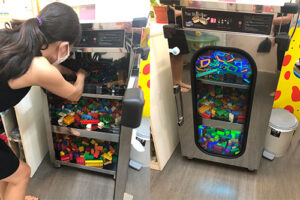
6. Our children enjoy healthy menus, planned by dieticians and nutritionists
When it comes to food, we focus on building healthy eating habits and preferences in children. Our children are treated to a wide variety of dishes from our tasty-yet-healthy menu, which is rotated bi-weekly to keep children’s interest in these healthy meals high. Every meal is planned by our expert dieticians and nutritionists, and prepared by our in-house chefs.
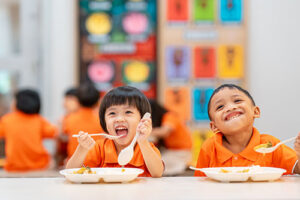
Best of all, we take pride in being recognised as a preschool that most Singaporeans can comfortably afford. As part of NTUC First Campus family, My First Skool provides affordable preschool education for children across Singapore while delivering exceptional value and quality. We also do our part to reach out to children from low income families with the Bright Horizons Fund, so every child can get a good head start in life.
So, if you believe that good preschools always come with big fees, we’d like to invite you to tour any of our 140 centres across Singapore, take a look at our learning environments, understand our curriculum, and check out our fees here. We look forward to seeing you!